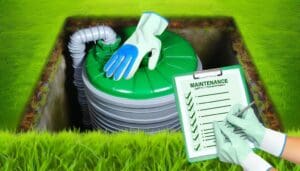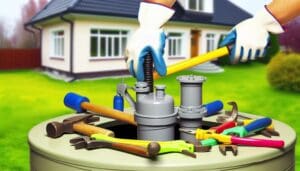Discover how to protect your septic system from breakdown with...
Read MoreYou & Your Septic Tank
From Sludge To Soil: How Septic Tank Pumping Benefits Your Lawn And Garden
Our professional septic service team offers comprehensive septic tank pumping services to keep your system running smoothly. Get a FREE Quote Today.

From Sludge To Soil: How Septic Tank Pumping Benefits Your Lawn And Garden
As a septic tank specialist, I’ve seen it all – the good, the bad, and the downright smelly. But let me tell you, there’s nothing more satisfying than transforming that waste into something beneficial for your lawn and garden.
That’s right; by pumping out your septic tank regularly, not only can you prevent unpleasant odors and costly repairs but also turn that sludge into nutrient-rich soil! It might sound too good to be true, but stick with me as I share my insider knowledge on how this process works.
We all have our little secrets when it comes to maintaining a lush green lawn or bountiful garden. Perhaps we whisper sweet nothings to our tomatoes, sing lullabies to our grass blades at night, or even perform rain dances during dry spells (hey, whatever works!).
However, one secret weapon in achieving an envy-worthy outdoor space is hiding right beneath our feet – yes indeed, it’s time to get up close and personal with your septic tank system! So join me as we delve into the world of sludge-to-soil transformation and discover how regular septic tank pumping could be just what your backyard has been craving.
Liberation from those pesky brown patches awaits!
What Is Septic Tank Pumping?
You might be wondering, ‘What is septic tank pumping?’ Well, as a septic system specialist, let me tell you!
Septic tank pumping is an essential part of maintaining your home’s wastewater treatment system. It involves the removal of sludge and scum that accumulates in your septic tank over time. Properly carrying out this process ensures that your entire septic system continues to function effectively and prevents any potential issues down the line.
Now that we’ve covered the basics of what septic tank pumping is, I’m sure you’re eager to know how it works. But before diving into the details, I want to emphasize one important thing: regular tank maintenance is crucial for preserving not only your lawn but also our environment.
By keeping up with routine checkups and pumpings on your property’s septic system, you can prevent costly repairs or even total replacement of the infrastructure.
So without further ado, let’s explore the fascinating process behind septic tank pumping and see how it benefits your lawn and garden!
How Does Septic Tank Pumping Work?
You know what they say, ‘a stitch in time saves nine.’ This age-old adage perfectly encapsulates the importance of septic tank maintenance and regular pumping. Not only does it benefit your lawn and garden but also helps prevent costly repairs or replacements down the line.
So, how exactly does this process work? As a septic tank expert with years of experience under my belt, I’m here to break it down for you.
First things first, let’s talk about sludge treatment and its role in keeping your system running smoothly. There are three key steps involved:
- Pumping: A vacuum truck is used to remove all liquid waste, solid waste (sludge), and scum from the tank.
- Treatment: The collected waste undergoes various treatments like bacterial digestion, chemical processing, or filtration – depending on local regulations and facilities available – to make it safe for disposal or reuse.
- Disposal/Reuse: Treated sludge can either be disposed of safely at designated facilities or repurposed as fertilizer for agricultural purposes.
This simple yet effective process ensures that your septic tank remains functional while minimizing any negative impact on the environment. More importantly, by taking care of routine tank maintenance now rather than later, you’ll not only save yourself a pretty penny but also contribute to maintaining a healthier ecosystem around your home.
So there you have it! Septic tank pumping works wonders when it comes to safeguarding both your financial investment and Mother Nature herself.
Next up: we need to discuss why regular pumping is essential for an efficient septic system; so stick around and let’s dive deep into the world of septic systems together!
Why Do I Need To Pump My Septic Tank?
You might be wondering, ‘Why do I need to pump my septic tank?’ Well, it’s all about keeping your sewage treatment system operating efficiently and preventing any unpleasant surprises in your backyard.
Regular septic maintenance is crucial for the longevity of your septic system, as well as preserving the overall health of your lawn and garden. Without proper care, a neglected septic tank can become overloaded with sludge and solid waste, which may eventually lead to costly repairs or even an entirely new system installation.
Now that you understand why regular pumping is essential, let’s dive into some fantastic benefits this simple service brings to both your lawn and garden.
By removing excess solids from the tank during pumping, you’re giving the remaining wastewater ample space for further processing by helpful bacteria found within the soil absorption field. This natural process allows nutrients from treated effluent to enrich nearby plants and grasses while simultaneously protecting local water sources from contamination.
So stay tuned in our next section where we will explore these fascinating perks more in-depth – trust me; you won’t want to miss it!
What Are The Benefits Of Pumping My Septic Tank?
You might be wondering, ‘What are the benefits of pumping my septic tank?’ Well, let me tell you – there’s more to it than just sewage management. Pumping your septic tank not only helps maintain the health and functionality of your system but also provides some fantastic advantages for your lawn and garden.
Let’s explore some of these key benefits:
- Improved soil fertility: By regularly removing sludge from your septic tank, you’re helping to break down organic waste that can eventually make its way back into your soil as nutrient-rich matter.
- Healthier plants: As a result of improved soil fertility, you’ll find that your plants will thrive with increased growth rates and yields.
- Less need for chemical fertilizers: With healthier soil comes less reliance on potentially harmful chemical fertilizers, which means a cleaner environment for everyone.
As we’ve seen, pumping your septic tank has far-reaching effects beyond mere sewage management. Not only does it ensure the proper functioning of your system (and avoid costly repairs), but it contributes significantly to maintaining healthy soil in your yard or garden. So next time you schedule a pump-out service, think about how much good you’re doing for both Mother Nature and yourself!
But now the question arises: How often should I pump my septic tank? Stay tuned as we dive further into this essential topic in our next section.
How Often Should I Pump My Septic Tank?
So, you’re probably wondering how often you should be pumping your septic tank to keep your lawn and garden thriving. Well, let me tell you that there isn’t a one-size-fits-all answer here because the frequency of septic maintenance depends on various factors such as the size of your household, the amount of wastewater generated, and even the design of your septic system.
However, I can assure you that establishing a regular tank maintenance schedule is crucial for protecting both your property’s environment and its value.
Now that we’ve established the importance of keeping up with septic maintenance, let’s dive into some general recommendations. For most residential properties, it’s a good idea to have your septic tank pumped every 3-5 years – but remember that this could vary depending on those aforementioned factors specific to your home. Make sure to consult an experienced professional who will assess your unique situation and provide tailored advice according to their expertise.
So now that we know when it’s time for a pump-out session, our next logical question would be: what should I do after my septic tank is pumped? Stay tuned because we’ll explore this topic in detail in our upcoming section!
What Should I Do After My Septic Tank Is Pumped?
So, you’ve had your septic tank pumped on a regular basis as recommended. Great job! Now that the professionals have done their part, it’s time to take advantage of this service and use sustainable practices in maintaining your lawn and garden.
After all, we’re all about harnessing nature’s power for our benefit while being kind to Mother Earth.
One way to make the most out of your freshly pumped septic tank is by utilizing natural fertilizers produced during the process. The nutrient-rich sludge removed from your tank can be further treated and transformed into eco-friendly compost or bio-fertilizer, which will help nourish your plants and promote healthy growth without resorting to harmful chemicals.
This not only saves you money but also contributes positively to the environment.
So go ahead – embrace these sustainable practices and watch how pumping your septic tank revitalizes both your land and lifestyle! In our next section, let’s delve deeper into understanding exactly how pumping your septic tank benefits your lawn and garden ecosystem.
How Can Pumping My Septic Tank Help My Lawn And Garden?
Imagine this: your neighbors John and Jane, who have a beautiful lawn and garden, recently decided to pump their septic tank. They’ve noticed that not only does their yard smell better, but their plants are thriving like never before!
As a septic tank system specialist, I can tell you that they’re onto something great here. Pumping out the sludge from their tank is freeing up space for alternative treatments and proper drain field maintenance, ultimately benefiting both their lawn and garden.
When you take the time to maintain your septic tank properly – which includes regular pumping – you’ll start to see some impressive benefits in your outdoor spaces as well. By removing the excess buildup of solids in your tank, you ensure that wastewater flows smoothly through the entire system. This means fewer backups or clogs within your pipes, allowing water to be distributed more evenly throughout your drain field.
In turn, nutrients from the treated wastewater serve as natural fertilizers for your lawn and garden without causing any harm to them. So go ahead and embrace this path toward liberation for yourself (and your yard) by making sure you schedule routine septic tank pumping appointments with professionals who care about keeping things running smoothly whilst preserving our environment too! But keep in mind there are risks if we don’t do so; let’s now discuss what those might entail…
What Are The Risks Of Not Pumping My Septic Tank?
Not pumping your septic tank can be a huge risk to your family and the environment. Contamination of nearby surface water and health hazards from bacteria and viruses are just a couple of the risks you face by not regularly maintaining your septic tank system.
Risk Of Contamination
I know it’s not the most pleasant topic, but let’s face it – neglecting your septic tank can lead to some serious risks for your lawn and garden.
One of the biggest concerns is the risk of contamination. When a septic tank isn’t pumped regularly, solid waste builds up and eventually overflows into the soil leaching field.
This can cause hazardous materials to seep into the ground water, which may then contaminate your plants, vegetables or even worse, nearby drinking wells!
It’s like inviting harmful bacteria and viruses to join you in celebrating freedom from constraints by dancing all over those precious greens you’ve worked so hard on cultivating.
So don’t wait until your backyard turns into a toxic playground; give that septic tank some well-deserved TLC before things take a nasty turn!
Health Hazards
Now that we’ve talked about the impact on your lawn and garden, let’s get personal – not pumping your septic tank can lead to some serious health hazards for you and those around you.
Soil contamination is just the beginning; water contamination brings a whole new level of danger!
As a septic tank system specialist, I can’t stress enough how important it is to stay ahead of these threats.
We all have this inner desire for liberation, but trust me when I say that freedom doesn’t taste very sweet when accompanied by nasty bacteria or viruses finding their way into your drinking water.
So before planning any backyard celebrations with loved ones, make sure your septic tank isn’t harboring party crashers nobody wants to deal with!
Are There Other Ways To Improve My Lawn And Garden?
You bet there are other ways to improve your lawn and garden! While septic tank pumping is a fantastic method for providing nutrients to your plants, you can also supplement this with natural fertilizers.
Let me share with you three amazing options that will make your garden thrive:
- Composting – Transforming kitchen scraps and yard waste into nutrient-rich compost not only reduces landfill waste but also provides an organic fertilizer for your plants.
- Manure – Animal manures from cows, horses or chickens contain high levels of nitrogen, phosphorus, and potassium – perfect ingredients for healthy soil.
- Cover crops – Planting cover crops such as clover or legumes during the off-season can help fix nitrogen in the soil and prevent erosion.
Now let’s talk about another crucial aspect: Soil aeration! A compacted lawn restricts the flow of water, air, and nutrients needed by plant roots for growth. Aerating your lawn helps loosen up the soil allowing these essential elements to penetrate deeper into the ground.
This process promotes healthier root systems which ultimately leads to more vibrant greenery above ground.
As we’ve discussed several methods to boost our lawns and gardens without relying solely on septic tank pumping benefits, it becomes clear how empowering it feels when taking control over nurturing our outdoor spaces holistically.
With renewed enthusiasm for greener yards and flourishing gardens, one might wonder what costs are associated with septic tank pumping? Let’s dive right into exploring that topic next!
What Are The Costs Associated With Septic Tank Pumping?
As the old saying goes, ‘you have to spend money to make money’ – and this certainly rings true when it comes to maintaining your septic tank. After exploring alternative ways of enhancing your lawn and garden’s health, it’s important that we now dive into the financial aspects of septic tank pumping.
While costs may vary depending on factors such as location, size of the tank, accessibility, and local regulations; investing in regular septic tank maintenance can save you from potential financial impact down the road. Neglecting your septic system could lead to costly repairs or even a full replacement due to damage caused by overflowing sludge or clogs.
Additionally, following local regulations regarding pump-out frequency helps avoid fines or penalties for non-compliance. All things considered, safeguarding your property value while preserving our shared environment is well worth the expenditure on professional services that ensure your septic system remains healthy and efficient.
So take charge of your home’s wellbeing and enjoy the peace of mind that comes with knowing you’re doing right by both yourself and Mother Nature!
Frequently Asked Questions
Can I Perform Septic Tank Pumping Myself, Or Should I Hire A Professional?
I know what you’re thinking – can I save some money and tackle septic tank pumping on my own?
As a septic system specialist, let me give you the lowdown. While there are plenty of DIY tips out there for many home projects, when it comes to septic tank pumping, it’s best to leave it to the professionals.
Trust me, we’ve got the right equipment and expertise to get the job done safely and efficiently. Plus, doing it yourself could lead to costly mistakes or even pose health risks!
So go ahead, liberate yourself from this dirty task and call in a pro for their professional advice. You’ll thank yourself later when your lawn and garden reap the benefits without any headaches (or messes) caused by attempting it solo!
How Can I Maintain My Septic System To Reduce The Need For Frequent Pumping?
We all want to feel liberated from the hassle of frequent septic tank pumping, and maintaining your septic system is key to achieving that freedom.
As a septic tank specialist, I highly recommend incorporating preventative maintenance practices into your routine for a worry-free experience.
This includes regularly inspecting your system, being mindful of what goes down your drains, and having it professionally serviced every 3-5 years.
Additionally, consider exploring upgrade options for enhanced efficiency and longevity – newer technologies can help reduce the need for constant attention on our beloved systems!
By proactively taking care of your septic tank, you’ll not only save time and money but also give yourself the peace of mind we all crave when it comes to home upkeep.
Are There Any Signs That Indicate My Septic Tank Needs To Be Pumped Sooner Than The Recommended Interval?
You bet there are signs to watch for!
As a septic tank system specialist, I’ve seen firsthand how an at-home inspection can help you spot issues before they become major problems.
If you’re noticing foul odors near the drain field or inside your home, standing water over the septic tank area, slow-draining sinks and tubs, or even sewage backups in your toilets or drains – these could all be indicators that it’s time to pump sooner than expected.
While some people may suggest using chemical additives to prolong pumping intervals, I caution against relying on them too heavily as they can actually harm your system in the long run.
Remember, taking care of your septic tank means freedom from costly repairs and having more time to enjoy life without worrying about plumbing disasters!
Is There A Specific Time Of Year That Is Best For Septic Tank Pumping To Maximize Benefits To My Lawn And Garden?
When it comes to reaping the rewards of septic tank pumping for your lawn and garden, timing is everything.
It’s like a well-choreographed dance between watering techniques, plant types, and our expertise as septic system specialists.
In general, the best time of year for septic tank pumping to maximize benefits to your lawn and garden is during the fall or early spring when plants are entering their dormant phases or just starting new growth cycles.
By pumping at these times, you’re giving your plants an extra boost from the nutrients in the sludge while avoiding any potential damage that could be caused by over-saturation during peak growing seasons.
Trust us on this one – we’ve seen some pretty impressive transformations with just a little bit of strategic planning!
So go ahead and break free from mediocrity by embracing optimal septic tank maintenance – your flourishing lawn and garden will thank you for it.
Are There Any Environmentally Friendly Or Alternative Septic Systems That Require Less Frequent Pumping?
Absolutely! There are several environmentally-friendly or alternative septic systems that require less frequent pumping, and even contribute to green energy production.
One example is the constructed wetland system, which uses natural processes to treat wastewater and provide a beautiful eco-friendly landscape.
Another option is an aerobic treatment unit (ATU), which breaks down waste more efficiently than traditional systems by using oxygen-loving bacteria.
Some innovative homeowners have even installed anaerobic digestion systems that convert waste into biogas, contributing to renewable energy sources while reducing their reliance on fossil fuels.
As a septic tank specialist, I’m always excited to help clients explore these sustainable options for managing their household wastewater in a way that benefits both their property and our precious environment.
Conclusion
In conclusion, nurturing your home’s septic system is a lot like tending to a flourishing garden. With proper care and attention, you can cultivate a thriving environment for both your lawn and the essential functions of your household.
By investing in professional septic tank pumping services, you’re not only protecting the health of your family but also nourishing the soil that gives life to your lush greenery.
As homeowners, we have a responsibility to maintain our septic systems properly which rewards us with fewer pumpings and avoiding unfortunate mishaps. It’s important to stay vigilant for any warning signs indicating an early need for pumping while keeping up-to-date on recommended maintenance practices.
And much like planning when to sow seeds or prune branches, timing your septic tank pumping during ideal seasons ensures maximized benefits for your landscape.
Lastly, let’s remember that as stewards of this beautiful earth, exploring environmentally friendly alternatives is crucial in preserving its vitality for generations to come. Keeping informed about innovative septic systems that require less frequent pumping demonstrates our commitment towards harmonious living with nature.
So grab those gardening gloves and give some love to both your blooming beds and trusty septic system because together they create the fertile foundation of a happy home.
You may also like...
Why Are DIY Fixes Essential for Septic Tank Pumping?
Tap into the importance of DIY fixes for septic tank...
Read MoreUnveiling the Average Costs of Septic Tank Pumping
Master the mysteries of septic tank pumping costs and avoid...
Read More
The Best Septic Tank Pumping Services Near You

Answer Some Questions
Let us know about your needs so we can find you the right septic tank pros.

Get Quotes
We will put you in touch with the right septic tank pros for your job and location.

Hire Right
Compare quotes, message or call pros, and hire only when ready.



